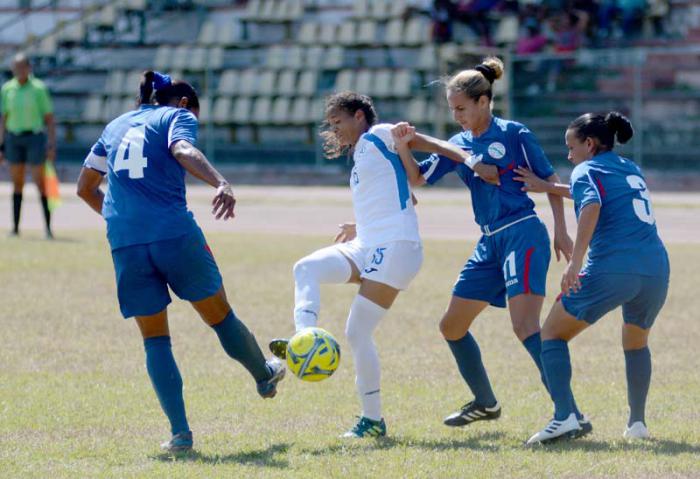April 28, 2018 3
The US and its Bad Neighbor Policy

The US and its Bad Neighbor Policy
By Lazaro Farinas
Posted: Monday 23 April 2018 | 09:31:55 PM
A CubaNews translation.
Edited by Walter Lippmann.
“Speak softly and carry a big stick, so you can go far.” That is the definition of the Big Crow’s policy implemented by President Theodore Roosevelt at the beginning of the last century. What became known as the Roosevelt Corollary established that “if a European country threatened or endangered the rights or property of US citizens or businesses, the US government was obliged to intervene in the affairs of that country to ‘reorder’ it”.
With the implementation of this Corollary, the American President was actually putting into practice the doctrine that James Monroe, who was the fifth president of this country, had proclaimed before the Congress in 1823. “America for Americans,” the president told the congressmen and the world. Of course, you have to understand that for Americans, Americans are Americans. Roosevelt, with his big stick, gave free rein to this country’s interventions in Latin America. Just a few weeks ago, former Secretary of State Rex Tillerson made a public statement that the old Monroe Doctrine was still in force.
Many countries have been invaded by U.S. military forces since Monroe proclaimed his famous doctrine, but even more have been the ones that have secretly suffered this country’s interventionism in its internal affairs; many governments overthrown in one way or another, many were the military dictatorships established with his support, many were the pressures to overthrow democratically elected rulers.
Fortunately, military interventions have disappeared from the hemisphere, but have been replaced by conspiracies, pressure and sanctions. Many Latin American countries have received and continue to receive this form of interference.
Venezuela and Cuba are classic examples of this approach, but countries such as Honduras, Brazil, Paraguay, Bolivia, Nicaragua and others cannot be left behind.
What is happening with Venezuela is incredible. The United States and its allies in the region and the Western world have mounted a campaign of disinformation about the homeland of Simón Bolívar and his government that is on the edge of infamy. Ever since the late Commander Hugo Chávez became president of that country through fully transparent and democratic elections, the United States and its international right-wing cronies began mounting a disinformative campaign against him and his government. In reality, they did not settle for anti-Chávez propaganda in the national and international media, but from there, they went on to practice, with a coup d’état, an oil strike, unbridled violence in the streets, etc.
The Venezuelan government is accused of everything in international organizations, in the discredited OAS, in the forums of the United Nations, in Unasur, now it has just been vetoed at the Summit of the Americas and in the Washington Congress, measures are being taken and sanctions are being created against the rulers of that nation.
The country that has set a record for holding democratic elections is accused of being an infamous dictatorship. A country that has held 20 elections in less than 20 years in power, fair and transparent elections, elections that have been supervised and observed by foreign organizations. They accuse the government of fraud in these elections, but we must ask ourselves, how is it that by fraud they lost the elections that took place a few years ago to elect the National Assembly?
According to them, Nicolas Maduro is an ironclad dictator, but how is it possible for such a dictator to accept freedom of the press, from which he is subjected to dirty campaigns. The right always says the same thing and uses the same speeches. When Donald Trump was running for president of the United States, he got tired of proclaiming that the American electoral system was fraudulent, but when he won the elections, he did not mention the issue any more.
Now that presidential elections are to be held again on 20 May in Venezuela, an international campaign has already begun to discredit them, despite the fact that several opposition candidates are running for the presidency. All the polls are giving it to Maduro as a winner, but what if an opposition candidate wins? Would they do like Trump did?
I don’t know if the day will come when a U.S. government will stop thinking of Latin America as its backyard and start to respect it. It is my hope that the day will come when you will truly forget what you have done so far and come to the conclusion that you must relate to that region with respect, that you will forget the Monroe Doctrine and the Big Club and that you will erase the carrot and stick theory. Because I love this country where I have lived for so many years and because I love Latin America, the region where I was born, I do not lose hope. Maybe I’m daydreaming.
Silence is not an option

In the face of gender-based violence, silence is not an option
Although in the First Workshop on Communication, Gender and Equity, organized by the Oscar Arnulfo Romero Center, the FMC and the National Center for Sexual Education, which took place in the province of Ciego de Ávila, progress was recognized in a series of stereotypes and prejudices , it is a priority to continue working to address the problem of physical, psychological, sexual or economic violence, in a transversal and multisectoral manner
Posted: Friday 27 April 2018 | 04:51:01 PM
 By Yuniel Labacena Romero
By Yuniel Labacena Romero
digital@juventudrebelde.cu
A CubaNews translation.
Edited by Walter Lippmann.
CIEGO DE ÁVILA: About ten women out of 30 reported having received some kind of physical, psychological, sexual or economic violence for 12 months, according to the Survey on Gender Equality, conducted in 2016 by the Federation of Cuban Women (FMC), which also revealed a low perception of this problem in our society.
These data demonstrate the urgent need to accompany, make visible, analyze, explain and systematically put the issues associated with gender violence in all areas of society, especially in the media, given their social function and scope.
It is precisely with this aim in mind that the First Communication, Gender and Equity Workshop, organized by the Oscar Arnulfo Romero Center, the FMC and the National Center for Sex Education, has been held to date, bringing together some 40 media professionals and actors with an impact on the public sphere from almost every region of the country.
During the days of debate, Cuban advances in a series of stereotypes and prejudices were recognized, but also that silence is not the option in the face of gender violence. The participants argued this statement, since this problem is often a hidden, naturalized, invisible fact, which is framed in a patriarchal culture. And in most cases, women are in a position of subordination to men, making them more vulnerable.
Tackling this problem should not remain a matter of slogans or tasks. There is a need to develop broader strategies that contribute to greater production and positioning of educational materials that reflect gender gaps and equities, as well as better implementation of public-good campaigns on the issue, the experts said.
Mareleen Díaz Tenorio, researcher for the Oscar Arnulfo Romero, explained that recognizing how acts of gender violence are evident is, in the first instance, the key point of how society and the media can achieve, together, the identification of this problem that affects a group of the unjustly called “weak sex” in the country.
It is essential to create awareness, consensus and political will so that all social actors can participate in this process. The longer we take to begin to transform, the more people will continue to suffer. Only respect for human beings will allow us to live in that better world that we need, the specialist said.
At the workshop – dedicated to the memory of Dr. Isabel Moya Richard, who was director of the Women’s Publishing House who was highly knowledgeable and a defender of gender issues – Eres más, a Cuban campaign for non-violence against women and girls, was presented, and the need to target specific actions at adolescent and youth audiences for their role in society was reiterated.
Women’s Soccer Wants More

Women’s Soccer Wants More
The coach of the Cuban women’s football team, Renier Bonora Peñalver, says he is satisfied with the progress made by his students in recent years.
———————————————————————————
Author: Yosel E. Martínez Castellanos | yosel@granma.cu
27 April 2018 00:04:44
A CubaNews translation.
Edited by Walter Lippmann.

Cuban women will be looking for a ticket to the 2018 Caribbean Cup in May. Photo: Ricardo López Hevia
The coach of the Cuban women’s football team, Renier Bonora Peñalver, says he is satisfied with the progress of his students in recent years.
The Camagüeyan strategist is an “old-school” man who has always been known for his commitment to the progress of his students, beyond the 90 minutes of each game and training practices.
“I say that I am not happy because there is always work to be done, to emphasize technical elements. These young women have a great future, they just need to believe it. We as coaches put all our knowledge to work for them, and they can do more,” said the mentor, who has been at the helm of the Cuban cast for three years.
In an interview with this newspaper, Bonora Peñalver said that, despite being in charge of a young squad, in recent years there has been sustained growth in Cuban women.
“The way we move on the court, with or without a ball, is very different from how we did it a couple of years ago. The players are already playing plays that we made during the training sessions,” she said.
This gradual evolution has led coaches to consider starting to implement the 3-4-3 game system, to the detriment of the 4-3-3-3 system they currently use. This change is due, according to Bonora Peñalver, to the fact that several players have refined their technique, both in defense and attack.
“Today’s philosophy is very different from that of the past, when we were looking for women who were fighters and who did a great deal of sacrificial work on the ground. At the moment we prefer them to come in with a good technique, to instill in them a way of playing together.
For Cubans, the immediate goal is to qualify for the 2018 Caribbean Cup, so in May they will be looking for the only ticket in the Dominican Republic, where they will have to compete against the Turks and Caycos Islands, Puerto Rico, Anguilla and the quisqueya hosts.
“We can take that quota. We played a couple of friendly matches two weeks ago against Nicaragua, who are one of the strongest opponents in the Central American area, and our players were in good physical condition, with several chances on goal.


You must be logged in to post a comment.